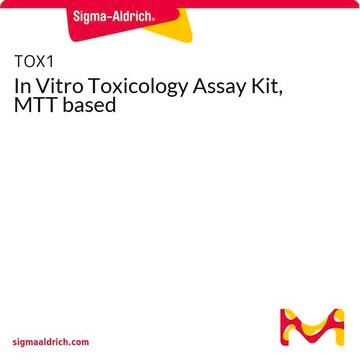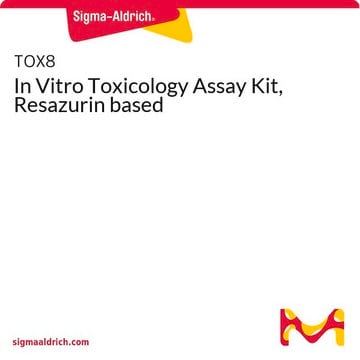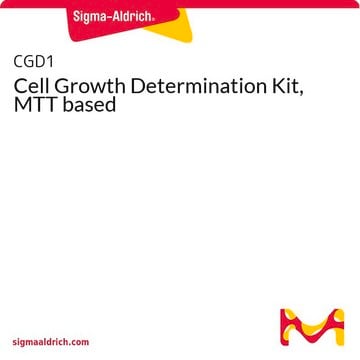Recommended Products
form
solid
usage
kit sufficient for 1,000 tests
packaging
pkg of 1 kit
storage condition
dry at room temperature
λmax
450 nm
application(s)
cell analysis
detection
detection method
colorimetric
storage temp.
−20°C
Application
For spectrophotometric measurement of cell viability by mitochodrial dehydrogenase. Absorbance of converted dye is measured at a wavelength of 450 nm.
Biochem/physiol Actions
Conversion of XTT to a water-soluble colored formazan derivative.
Signal Word
Danger
Hazard Statements
Precautionary Statements
Hazard Classifications
Self-react. C
Supplementary Hazards
Storage Class Code
4.1A - Other explosive hazardous materials
WGK
WGK 3
Personal Protective Equipment
dust mask type N95 (US), Eyeshields, Gloves
Certificates of Analysis (COA)
Search for Certificates of Analysis (COA) by entering the products Lot/Batch Number. Lot and Batch Numbers can be found on a product’s label following the words ‘Lot’ or ‘Batch’.
Already Own This Product?
Find documentation for the products that you have recently purchased in the Document Library.
Customers Also Viewed
Queenie P Vong et al.
Blood, 124(26), 3905-3913 (2014-10-30)
Thymocyte selection-associated high mobility group box protein family member 2 (TOX2) is a transcription factor belonging to the TOX family that shares a highly conserved high mobility group DNA-binding domain with the other TOX members. Although TOX1 has been shown
Sandrine Chabane et al.
Applied and environmental microbiology, 72(5), 3259-3267 (2006-05-05)
ECM33 encodes a glycosylphosphatidylinositol-anchored protein whose orthologs in yeast are essential for sporulation. Aspergillus fumigatus Ecm33p is unique and has an apparent mass of 55 kDa. Disruption of A. fumigatus ECM33 results in a mutant with several morphogenetic aberrations, including
Sangiliyandi Gurunathan et al.
Nanoscale research letters, 9(1), 373-373 (2014-08-20)
Silver nanoparticles (AgNPs) have been used as antibacterial, antifungal, antiviral, anti-inflammtory, and antiangiogenic due to its unique properties such as physical, chemical, and biological properties. The present study was aimed to investigate antibacterial and anti-biofilm activities of silver nanoparticles alone
O S Weislow et al.
Journal of the National Cancer Institute, 81(8), 577-586 (1989-04-19)
We have developed an effective and optimally safe microculture method for rapid and convenient assay of the in vitro cytopathic effects of human immunodeficiency virus (HIV-1) on human lymphoblastoid or other suitable host cells. The assay procedure is applicable to
Eunsohl Lee et al.
Journal of cellular biochemistry, 117(12), 2815-2824 (2016-05-07)
Prostate cancer (PCa) is known to develop resistance to chemotherapy. Growth arrest-specific 6 (GAS6), plays a role in tumor progression by regulating growth in many cancers. Here, we explored how GAS6 regulates the cell cycle and apoptosis of PCa cells
Our team of scientists has experience in all areas of research including Life Science, Material Science, Chemical Synthesis, Chromatography, Analytical and many others.
Contact Technical Service







